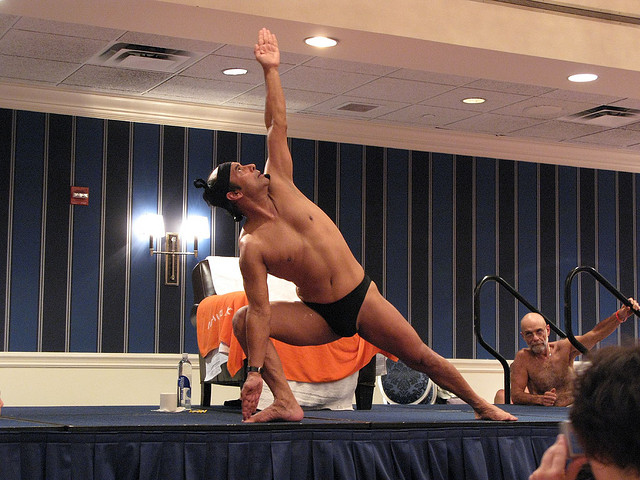
Eleditor’s note: Elephant is a diverse community of sixteen million readers and hundreds of writers (you can write too!). We are reader-created. Many blogs here are experience, opinion, and not fact or The One Right Point of View. We welcome all points of view, especially when offered with more sources and less invective, more frankness and less PR. Dislike this Op-Ed or opinion? Share your own take here.
My husband sent me an article this morning about the Infamous Bikram: there’s a new allegation that he threatened one of the legal aid’s lives.
I was surprised by my reaction—which was, unfortunately, “non-surprise.”
With all of the sexual abuse allegation scandals and his attempt to trademark and make a series of 26 asanas as his own, I was waiting for another dark allegation to arise—and this one certainly is dark.
As a yogi who has practiced on and off for many years, I always shied away from the hot classes, which in the early years of my practice was a huge service to myself as Bikram was all the rage at the time. The ongoing conversations and arguments surrounding benefits (or detriments) aside, this brings up an interesting topic that I’ve been ruminating on for a while…
The egotism involved with teaching the practice of yoga.
My intent is not to infuriate, not to cause more arguments or division within the community; it is to simply reflect and call others to reflect on their own egos. As holders of space for an individual’s asana practice we are just that—holders of space and a mere guide on an individual’s personal and life long journey.
I often say “you are your own teacher,” and I would like to say “you are your own Guru,” but the word “guru,” for me, carries a negative connotation, conjuring up visions of egomaniacal teachers.
I recently began guiding classes for others, and I’m very honored and humbled to have the opportunity to be invited and trusted to witness an individual’s journey of self-discovery, and to have some influence over their own self-improvement and self-awareness. At the same time, I consider myself their student, learning so much about myself and my practice from them.
In teaching, I’ve seen (or at least have been made more aware of) egotism in some teachers. Thankfully, it is not nearly as extreme as what I see in Bikram, but I occasionally see daggers of it, which scares the hell out of me.
There is a fine line—some are looking for that guru outside of themselves. Some are so willing to let you, as a teacher and as a holder of space for them, to their “guru.” I believe that most begin teaching yoga for very honest and passionate reasons while some, conversely, seek to be the next Bikram. This mindset of the “guru” being outside of oneself leaves the door open for many a teacher, even the honest and humble, to build upon their own guru ego.
When one steps into the yoga studio to guide a class, let it be in the spirit of service, for a deep love of the practice, to share all the numerous benefits that the practice has shown you—not for notoriety, fame, a fan base, a bigger paycheck, Instagram followers, or Facebook likes. Teaching yoga as a means of sole income can lead many down this path. George Washington warned us about political parties detracting from the purpose of improving and protecting the country. I also believe someone warned against being a politician full time.
The underlying point is: when something is done out of financial reasons (or other personal gain) rather than out of pure passion and love of the subject matter, we all lose; see Bikram- case and point (and just look at America’s politicians today, but that’s another diatribe). Yes, there are some phenomenal full time teachers, and they are the ones who remain humble, passionately share their practices, and act out of service to others—not out of self-promotion.
As teachers, we must remember that we are still students, in many ways still the same as the yogi in their very first class.
As the lovely 9th Circuit Court upheld, something all good yoga teachers already knew—noone owns yoga; it was never intended to be owned. The framework was set out for all individuals to learn and discover their own unique and individual path to enlightenment, self-love and a stronger connection to the universe around them.
Teachers, we can learn something from the famous hot guru, an example of how not to be. Let’s remember why we love yoga so much and share our love and experiences with our students without expectation of fame, popularity, the big bucks.
For everyone: you are your best teacher.
Look within to find your guru.
Namaste.
Author: Johanna Goodwin
Editor: Renée Picard
Image: Flickr/Yaniv Nord


Read 4 comments and reply